by M. C. Jennings | Oct 31, 2024 | Academics, Careers In..., COBA Faculty, COBA Staff, College Decisions, Current Students, Faith Infusion, Marketing, Outcomes, Professional Development, Student Spotlights, Student Spotlights
 Senior marketing major Carol Queiroz from Brazil recently completed a rewarding internship at Imaginuity, a marketing agency based in Dallas. Her experiences during this internship have not only enhanced her skill set but also prepared her for future career opportunities.
Senior marketing major Carol Queiroz from Brazil recently completed a rewarding internship at Imaginuity, a marketing agency based in Dallas. Her experiences during this internship have not only enhanced her skill set but also prepared her for future career opportunities.
Carol’s internship at Imaginuity was part of a rotational program, allowing her to gain hands-on experience in various departments. Throughout her time there, she explored areas such as social media, user experience, website creation, and client partnership. This exposure to diverse aspects of marketing provided her with a well-rounded understanding of the industry.
One of Carol’s favorite aspects of the internship was building website pages. This opportunity allowed her to combine her creative skills in content creation with the technical skills required for website development. She relished the chance to see her ideas come to life in a digital format, reinforcing her passion for marketing.
Carol said that learning to be adaptable was one of the greatest lessons she gained from her internship. She learned that even in areas where she initially had little interest, there were valuable insights and skills to be gained. This lesson in flexibility is one she believes will serve her well in her future career.
Interning at Imaginuity has opened numerous doors for Carol. The diverse experiences she gained will enable her to apply for various job opportunities after graduation, equipped with a unique skill set that few candidates possess. While she has been encouraged to apply for a full-time position at Imaginuity, Carol has also been accepted into a master’s program in communication at ACU, which she is excited to pursue.
For students seeking internships, Carol offers some sage advice: “Go to the career fair! I got my job there. Also, talk to Jasmine as much as possible. She is a good resource to help with your resume and job search.” She also recommends building a network on campus and maintaining relationships with professors which can open unexpected opportunities in the future.
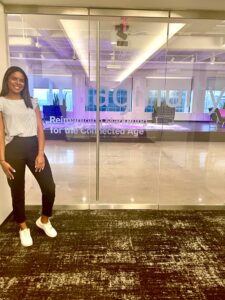 Carol credits her time at ACU as essential preparation for her internship and future endeavors. The Professional Development team, in particular, has been instrumental in her journey, providing support and resources throughout her college years.
Carol credits her time at ACU as essential preparation for her internship and future endeavors. The Professional Development team, in particular, has been instrumental in her journey, providing support and resources throughout her college years.
Being a business major at ACU has not only equipped Carol with technical knowledge but also essential life skills. She values the lessons in negotiation, networking, and entrepreneurship that she has gained, stating, “This knowledge is something that no one can take away from me and something that I will carry with me for life. I am very grateful to have received all of this at COBA.”
As graduation approaches, Carol reflects on her three years at ACU with gratitude. Her advice to current students is to savor every moment of their journey. “The whole process you’re going through on campus is preparing you for life off campus,” she emphasizes.
With her newfound skills and experiences, Carol is well-prepared to take on the next chapter of her life, whether in a full-time role or as a graduate student. Imaginuity has played a pivotal role in shaping her future, and she looks forward to what lies ahead.
by M. C. Jennings | Oct 3, 2024 | Accounting, College Decisions, Current Students, Faculty Testimonials, Faith Infusion, MAcc, Outcomes, Placement stories, Student Spotlights, Student Spotlights, Uncategorized
Senior accounting major Katelynn Oksanen spent her summer break interning at EY’s Dallas office, where she gained invaluable insights into the world of auditing. Katelynn’s experience not only deepened her understanding of the audit process but also equipped her with skills that will serve her well in her future career.
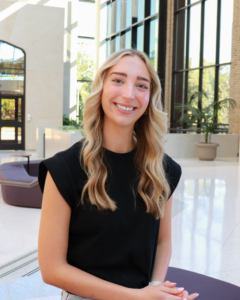 At the outset of her internship, Katelynn participated in a comprehensive training program alongside other audit interns from the region. This training provided her with foundational knowledge and set the stage for her subsequent hands-on experience. One highlight of her internship was the Intern Innovation Experience, where she explored data visualization and analysis tools crucial to the accounting profession. This exposure to cutting-edge technologies broadened her perspective on the role of data in auditing.
At the outset of her internship, Katelynn participated in a comprehensive training program alongside other audit interns from the region. This training provided her with foundational knowledge and set the stage for her subsequent hands-on experience. One highlight of her internship was the Intern Innovation Experience, where she explored data visualization and analysis tools crucial to the accounting profession. This exposure to cutting-edge technologies broadened her perspective on the role of data in auditing.
Throughout her time at EY, Katelynn collaborated with various teams, assisting with multiple components of the audit process. This collaboration not only enhanced her technical skills but also allowed her to develop a deeper appreciation for teamwork. “I enjoyed working with the teams I was assigned to and getting to know the employees and other interns at the firm,” Katelynn reflected. “The hands-on experience I gained is something that’s hard to replicate in the classroom.”
Katelynn’s internship also reinforced her ability to communicate effectively within a team, a skill that is essential in any professional setting. She noted that this experience provided her with a clearer understanding of what auditing looks like in a large-scale business environment, bridging the gap between theoretical knowledge and real-world application.
Looking ahead, Katelynn is excited to share that her internship is leading to full-time employment with EY. This opportunity reflects her hard work and the connections she made during her internship.
For students seeking internships, Katelynn offers invaluable advice: “Put yourself out there! There are many companies eager to hire you and get to know you. In addition, don’t be afraid to reach out to ACU alumni. ACU has a strong alumni network that wants to help ACU students find jobs and internships.”
Katelynn credits her time at ACU for preparing her for this pivotal internship. “Many of my courses and professors provided real-life scenarios and deeper knowledge that prepared me for the tasks involved in my internship. Additionally, many resources on campus helped me prepare the documents needed to secure a job, such as resume-building services through COBA’s professional development staff. One of the most rewarding aspects of being a business student at ACU has been the exceptional support from our professors. They genuinely care about their students and make an effort to get to know who is in their classroom. It’s evident that they want to see their students succeed!”
 As Katelynn embarks on her professional journey, her experiences at EY and the foundation laid at ACU will undoubtedly propel her toward success in the accounting field. Her story is an inspiring reminder of the impact of internships and the importance of seizing opportunities in one’s academic and professional journey.
As Katelynn embarks on her professional journey, her experiences at EY and the foundation laid at ACU will undoubtedly propel her toward success in the accounting field. Her story is an inspiring reminder of the impact of internships and the importance of seizing opportunities in one’s academic and professional journey.
To learn more about the College of Business at ACU, click here.
To learn more about ACU’s Career fair, click here.
by M. C. Jennings | Sep 26, 2024 | Academics, College Decisions, Current Students, Marketing, Outcomes, Student Spotlights
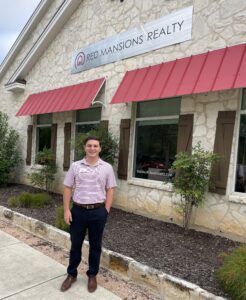 Senior marketing major Noah While efficiently combined his academic knowledge with practical experience through an internship at Red Mansions Realty during his summer break. Throughout his tenure, Noah engaged in a diverse range of marketing activities, including the development of training materials for real estate agents. His contributions encompassed creating training materials for agents on procedures for tenant move-in forms, operating 360 cameras for property reviews, and utilizing marketing tools such as Canva to enhance their market presence.
Senior marketing major Noah While efficiently combined his academic knowledge with practical experience through an internship at Red Mansions Realty during his summer break. Throughout his tenure, Noah engaged in a diverse range of marketing activities, including the development of training materials for real estate agents. His contributions encompassed creating training materials for agents on procedures for tenant move-in forms, operating 360 cameras for property reviews, and utilizing marketing tools such as Canva to enhance their market presence.
Additionally, Noah undertook various office tasks that contributed to quality control and operational efficiency. He worked with the handyman to manage minor projects, such as smoke detector installations and worked to strengthen investor relations within the property management and commercial real estate sectors. His responsibilities included maintaining up-to-date investor documentation and loan details, thereby supporting both internal and external stakeholder communication.
Noah noted that the aspect he enjoyed most about his internship was the positive and communicative environment fostered by his colleagues. He commented, “There wasn’t a day that I felt uncomfortable and they really made the workplace fun and easy.” Through this experience, Noah learned that effective communication is essential for the smooth operation of a business and that mastering the art of clear and efficient communication with vendors, investors, and employees significantly enhances organizational flow and success.
The internship provided Noah with great insights into the real estate and property management fields, areas he has been interested in since high school. This experience not only deepened his understanding of the industry but also expanded his professional network in New Braunfels, enhancing his future job prospects.
Noah offers valuable advice to prospective interns to get an early start in their internship search as they can be challenging to obtain. “Once you do get an internship, dive straight in and be the best example of ACU you can possibly be with your work ethic and values that you have learned thus far.”
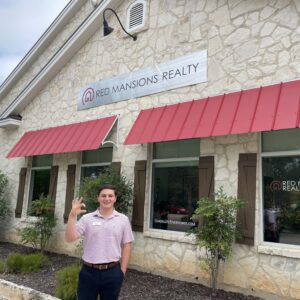 Noah said that his time at ACU has equipped him in several significant ways. Firstly, it has fostered more independence and confidence in his decision-making. Additionally, the networking opportunities and connections he’s made have been invaluable. Personally, he said “My faith has grown since being at ACU, which has reshaped my perspective on the business world. This most definitely is going to prepare me for life after graduation because keeping God first is what really matters.”
Noah said that his time at ACU has equipped him in several significant ways. Firstly, it has fostered more independence and confidence in his decision-making. Additionally, the networking opportunities and connections he’s made have been invaluable. Personally, he said “My faith has grown since being at ACU, which has reshaped my perspective on the business world. This most definitely is going to prepare me for life after graduation because keeping God first is what really matters.”
As he reflected on his favorite aspect of being a business major at ACU, Noah said that it’s been getting to know the professors at ACU saying, “You can see God shine through these professors daily while teaching and that is something I will cherish and look up to forever. Hearing that your professors are in the same Bible classes at church or serving as elders is really cool and admirable.”
To learn more about the College of Business Administration, click here.
To learn more about COBA’s upcoming Career Fair, click here.
by M. C. Jennings | Mar 21, 2024 | Academics, COBA Events, COBA Faculty, College Decisions, Current Students, Faith Infusion, Special Speakers, Uncategorized
written by special contributor, Lance Fleming
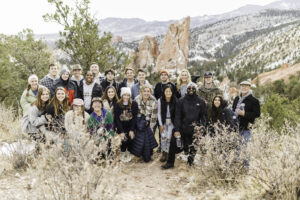 For 26 years, the ACU College of Business Administration has hosted a Leadership Summit in the mountains of Colorado intended to re-energize the mind, body, and soul. Each Summit takes on a life of its own, providing answers to the questions the attendees bring with them each year.
For 26 years, the ACU College of Business Administration has hosted a Leadership Summit in the mountains of Colorado intended to re-energize the mind, body, and soul. Each Summit takes on a life of its own, providing answers to the questions the attendees bring with them each year.
The recently completed 2024 version of Leadership Summit wasn’t different. This year’s version might have been the most diverse session of any of the 26 that have occurred.
Established in 1998 in the College of Business Administration, Summit is a one-week, 3-hour course hosted in picturesque Colorado. The course blends academic rigor with an environment ripe for deep, personal, and lasting encounters with Jesus. Dr. Rick Lytle, Tim Johnston (‘80), and Mike Winegeart (’86) dreamed of an experience that would take students out of the regular classroom and inspire them to think of their future work as missional. The first Leadership Summit was held in 1998, and the trio would go on to be involved in various aspects of the class over the next few decades.
Leadership Summit is open to all majors and classifications on campus – it’s not just for business students. Because this year’s cohort consisted of so many non-business majors, Dr. Dennis Marquardt, Associate Professor of Management and Director of the Lytle Center for Faith and Leadership, said Summit 2024 started a bit differently than other sessions.
“This was one of our most diverse groups along the lines of classification and major, so the first few days of Summit were really about getting to know each other,” he said. “It takes time to trust one another and be vulnerable with each other, which is an important aspect of the growth process at Summit. We also hosted more speakers than ever and from a wide range of industry backgrounds, so the week was packed, especially the first two days. By Wednesday, I noticed the group came together and opened up around some deep spiritual topics.”
The base curriculum for this year’s Summit centered around two books: Christian Reflections on the Leadership Challenge by Jim Kouzes and Barry Posner and The Freedom of Self-forgetfulness by Tim Keller. Each day is assigned one of the five leadership practices from the Leadership Challenge – Model the Way, Inspire a Shared Vision, Challenge the Process, Enable Others to Act, and Encourage the Heart – but every speaker is encouraged to share their spiritual journey in whatever way the Spirit moves.
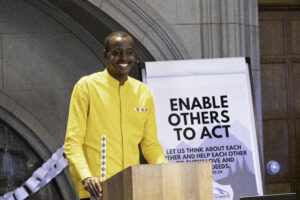
Serge Gasore (’09), co-founder of Rwanda Children
This year, Marquardt said, notable themes emerged across topics such as forgiveness from Serge Gasore (’09) and Tonya Carruthers, pride and humility from Tim Goeglein and Tony Roach (’01), and vision and role-modeling from Elise Mitchell (’83) and April Anthony (’89). Each speaker, he said, is encouraged to be transparent and vulnerable, creating an environment for deep collective reflection and sharing with the students. When that happens, Jesus takes over, and theory and books fade into the background.
“It’s one thing to learn about theory and read textbooks on leadership, and there certainly is a place for that,” Marquardt said, “but true learning and growth happens in community and relationships. Summit is distinct because it pairs the best leadership teaching with the spirit and heart. The environment is ripe for true reflection on how we become the servants God calls us to be so that we might be people of influence known for bearing hope, peace, and love.”
Hayden Poorman – a senior from Tuscola graduating in May and triple-majoring in finance, accounting, and information systems – completed his second trip to Summit in January. Like last year, Poorman said he left Colorado Springs with a definite direction for his life.
“Last year, I felt incredibly empowered to make changes in my life and impact those around me,” Poorman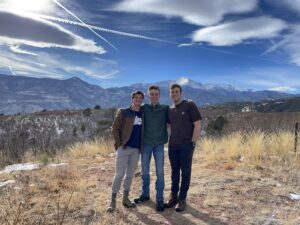 said. “For instance, after coming down from the mountain, my friend Matthew Trow (’24) and I initiated a Real Estate & Banking club on campus to assist students in navigating the industry. This year, I went to Summit seeking Godly wisdom and guidance and a time to wrestle with my inner struggles.
said. “For instance, after coming down from the mountain, my friend Matthew Trow (’24) and I initiated a Real Estate & Banking club on campus to assist students in navigating the industry. This year, I went to Summit seeking Godly wisdom and guidance and a time to wrestle with my inner struggles.
“Instead of feeling energized and engaging in constant hiking and exploration (though I did still hike), I found solitude in the mountain landscape and sought God,” he said. “ I firmly believe that God worked on me in the stillness of the mountains. I left the mountain prepared to confront my final semester of college and effectively navigate the valley I was traversing.”
Poorman said one reason he felt ready to take on the final weeks of his collegiate experience was the nightly conversation with his roommate on the trip, Mason Graham (’25).
“We discussed the day’s topics and delved into how life was unfolding for each of us, offering support and encouragement,” Poorman said. “Mason played a pivotal role in helping me articulate my thoughts and was instrumental in navigating my journey through faith and suffering.”
Allie Harper, a junior Bible and ministry major from Carrollton, was deeply affected by the connections with students and speakers during the six days spent on the mountain.
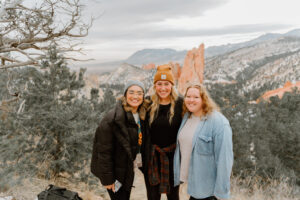 “I think what makes Summit so impactful for people is that you get to retreat from everyday routine and spend time with like-minded people,” Harper said. “The connections and friendships I made at Summit are special because of our unity in Christ. Those connections have given me people to rely on, whether needing strong leaders to help with a ministry event or business and finance advice.
“I think what makes Summit so impactful for people is that you get to retreat from everyday routine and spend time with like-minded people,” Harper said. “The connections and friendships I made at Summit are special because of our unity in Christ. Those connections have given me people to rely on, whether needing strong leaders to help with a ministry event or business and finance advice.
“Something I remembered during one of the morning sessions was the people in my life I love who don’t know Christ,” she said. “Needless to say, I was a teary mess but also felt loved and encouraged by those who sat with me and prayed for those people. It reminded me that sometimes we have to sit in grief, but the Lord always brings hope and joy.”
This year’s Summit was Harper’s first venture to the mountain castle, and she said she came away with a deeper appreciation of the skills needed to be effective in ministry.
“I wasn’t sure what exactly to expect at Summit, but the whole week, I was surprised by the connections to faith, scripture, and community,” she said. “I saw what good Christian leadership looks like through the speakers, professors, and fellow students. It reminded me of the importance of leadership skills and not just a knowledge of scripture. I realized that to be effective as a minister, I need both. I would encourage those who aren’t pursuing a career in ministry but in the business world that God has called and equipped them because the world needs more Christ-like teachers, financial advisors, doctors, and salespeople. I left the week grateful because I had been equipped with scripture and the leadership skills to make me a better minister.”
And those moments – of reflection, self-awareness, and enlightenment – help make the moving parts that go into planning a week-long, out-of-state conference worth it for Marquardt.
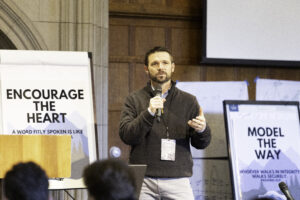
Dr. Dennis Marquardt
“There was just a moment this year when the Summit program began, and I looked at all of us worshipping together and about to embark on this special experience for the next week, and it broke me,” Marquardt said. “God is good. And He is gracious to allow us such a transformational experience.”
And that experience is what the first 26 Leadership Summits have given each participant and will continue to be the focus of in the future.
“God does amazing things, and He chooses to do those things through His people,” Marquardt said. “When we surrender to Him, our lives become this grand Kingdom adventure (which is not always safe or easy), but it allows us to serve others in transformational ways. That service might be as a business leader, community member, or in a family, but we will all have the opportunity to step into it. We want Leadership Summit to create leaders who are servants first and run into the storms and fires of life to be bearers of hope, peace, and life.”
by M. C. Jennings | Mar 7, 2024 | Academics, Careers In..., COBA Faculty, College Decisions, Current Students, Dukes School of Finance, Financial Management, Uncategorized
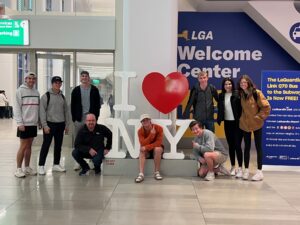 Most trips to New York City involve plenty of sightseeing, tours, shows and musicals, and expensive trips to some of the world’s best restaurants. They don’t usually involve sit-down meetings with some of the top financial minds in the country. But that was the design of a trip to New York last fall for eight students in ACU’s Dukes School of Finance.
Most trips to New York City involve plenty of sightseeing, tours, shows and musicals, and expensive trips to some of the world’s best restaurants. They don’t usually involve sit-down meetings with some of the top financial minds in the country. But that was the design of a trip to New York last fall for eight students in ACU’s Dukes School of Finance.
Those students – seven of whom are in the first cohort of the Dukes Scholars – were led on the trip by Dr. Jonathan Stewart, professor in the Dukes School of Finance. Stewart has been taking students to New York for several years, allowing them to visit some of the top financial institutions in the world and ask questions of the leaders of those companies to find out what it takes to make it in New York.
Stewart and his students were in New York from Oct. 18-22, visiting with leaders from Bank of America, Evercore, Court Square Capital Partners, Tiger Global Management, RBC Capital Markets, and Goldman Sachs. They toured Nasdaq and met with some of the leadership of the second-largest stock exchange in the world. They also met with a panel of young professionals in the finance industry who are members of the Manhattan Church of Christ.
“We had an opportunity to encourage and inspire those students to work in New York or another financial center,” Stewart said. “It’s all happening there (in New York), and we put our students in front of many talented people on the trip.
“We have a lot of students interested in investment banking, so going to Goldman Sachs and Royal Bank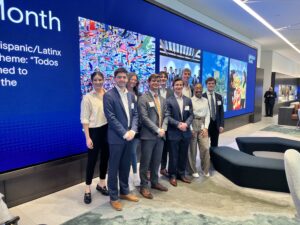 Canada (RBC) was great for them,” he said. “We went into RBC, where they set us up in the conference room, and we had people talking to us who were dealing in high-level investments and acquisitions daily.
Canada (RBC) was great for them,” he said. “We went into RBC, where they set us up in the conference room, and we had people talking to us who were dealing in high-level investments and acquisitions daily.
“Our students were able to interact with a wide range of people who had made a career out of that field, but also some in the room who were just a year or two older than our current students,” Stewart said. “That gave them a chance to interact with and ask questions of someone close to their age.”
Kaylee Smoot, a native of Corona, California, who will graduate in May with her Master’s in Accounting, said the time spent with executives of some of the top financial institutions in the country was invaluable.
“That time was priceless,” Smoot said. “We heard from many executives, including from specialized private equity firms and international finance companies, and even received a tour of the Goldman Sachs Headquarters. We had students ranging from first-year to graduate level, and we were each able to walk away with invaluable knowledge about what opportunities awaited us in our future careers.”
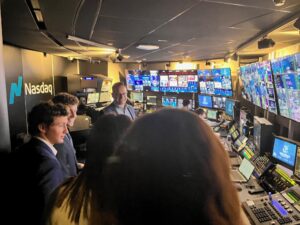 Stewart said he always gets help from ACU alums in the financial industry, using their connections and contacts with industry leaders in New York to set up the trip. One of those ACU graduates who helped this year was COBA alum Steve Swinney (‘94), based in Colorado and the CEO of Kodiak Building Partners who tapped his contacts in New York to meet with students from his alma mater.
Stewart said he always gets help from ACU alums in the financial industry, using their connections and contacts with industry leaders in New York to set up the trip. One of those ACU graduates who helped this year was COBA alum Steve Swinney (‘94), based in Colorado and the CEO of Kodiak Building Partners who tapped his contacts in New York to meet with students from his alma mater.
Swinney said he hoped his contacts showed the ACU students all that is possible for them in finance.
“The Dukes School of Finance at ACU is a tremendous opportunity for finance students to have so many career doors opened to them that maybe they haven’t had in the past,” he said. “I wanted them exposed to all that is possible for them. They must know their ACU education is preparing them for great things. We need excellent Christian finance leaders in the business world.”
A crucial part of the trip for Stewart and Smoot was discussing how faith and business mix. Stewart said that while making connections was paramount for the students, allowing those students to see that faith and high finance can mix was just as important. That’s why the panel with professed Christians who are also leaders in the financial industry was part of the tour. The time shared at Manhattan Church of Christ was to ensure the ACU students left New York knowing their faith wouldn’t be trampled in the City That Never Sleeps.
“Taking your faith into the business world might look different in New York than it would in Abilene or Dallas because there are so many perspectives and different points of view in a big city than in a place like Abilene,” Stewart said. “But to see there’s a place for Christian businessmen and businesswomen to function and contribute and be part of that world was, hopefully, a healthy opportunity for our students.”
Dallas because there are so many perspectives and different points of view in a big city than in a place like Abilene,” Stewart said. “But to see there’s a place for Christian businessmen and businesswomen to function and contribute and be part of that world was, hopefully, a healthy opportunity for our students.”
Smoot, who hopes to secure a financial analyst position in Dallas after graduation, said those conversations were the most important to her on the trip.
“In recent decades, we have seen the damage immoral and unethical behavior can do in the finance industry, with many people’s livelihoods still suffering the consequences,” she said. “To receive an education that equips you with the knowledge to be successful in finance while grounding you with Christ-centered values strengthens your chances of being a light for Christ in a world and industry that desperately needs it.
“We already see an example of this in the STAR course offered at ACU, a student-managed investment fund I had the honor of leading last semester,” Smoot said. “We are exposed to real-world dilemmas involving not only the quantitative side of the stock market but also the qualitative side of the finance industry as we discuss the financial and ethical motivations behind different investments we make on behalf of the university.”
New York City comes with preconceived notions, from the friendliness of its citizens to the high cost of living to safety. But by sitting down with those industry leaders, touring Nasdaq, taking in a show on Broadway, going through the 9/11 Museum, and giving the students time to explore the city, Stewart said he hopes the students began to see New York in a new light.
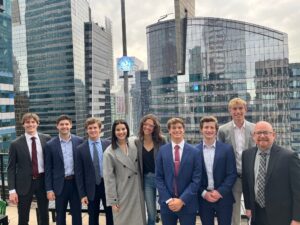 “We wanted the students to make real connections, and when you have eight students sitting in a room with three or four investment bankers, that’s a great opportunity,” Stewart said. “They had a real chance to talk to them, to exchange business cards, and network. There are so many stereotypes of New York, but it’s one of the world’s great cities, and having the experience of moving around and riding the subway and seeing the landmarks and everything that goes along with New York City was so much fun to share with those students. We see the cutthroat part of the financial industry in the movies and on TV all the time, and some of that is probably true. But many people are out there doing things the right way and have a faith background and a belief system, and they put that in action every day.”
“We wanted the students to make real connections, and when you have eight students sitting in a room with three or four investment bankers, that’s a great opportunity,” Stewart said. “They had a real chance to talk to them, to exchange business cards, and network. There are so many stereotypes of New York, but it’s one of the world’s great cities, and having the experience of moving around and riding the subway and seeing the landmarks and everything that goes along with New York City was so much fun to share with those students. We see the cutthroat part of the financial industry in the movies and on TV all the time, and some of that is probably true. But many people are out there doing things the right way and have a faith background and a belief system, and they put that in action every day.”
And for Smoot, putting some of those preconceived ideas to rest was just as important as anything else she took away from the trip.
“When you think of Wall Street, you may imagine exhausted employees working 100-plus hours a week, day trading at a giant corporation that becomes their only identity,” she said. “I’m happy I walked away realizing that while the finance industry in New York does require hard work and long hours, those individuals still have a life. And many of their companies offer impressive on-site benefits to assist with the burden long workdays may exert on them. It makes someone’s dream of working on Wall Street shift from daunting to doable, as long as you are willing to still chase after it.”
And each trip Stewart leads helps to re-energize him, he said.
“I love going to New York and being in the middle of everything,” said Stewart, who thanked Swinney, David Swearingen, and Jim Litton (‘01) for their help in setting up the schedule of tours and visits. “It’s the heart of the financial world, especially in our country. I learn something new on every trip, and I come back energized, inspired, and thinking about ways I can incorporate what we’ve learned on the trips into what we’re learning in the classroom. It inspires me to stand in front of our students and encourage them to dream big and do what they want to do because they can make it happen. We are fortunate to have many people here and ACU friends and family willing to help make that happen.”
Swearingen, and Jim Litton (‘01) for their help in setting up the schedule of tours and visits. “It’s the heart of the financial world, especially in our country. I learn something new on every trip, and I come back energized, inspired, and thinking about ways I can incorporate what we’ve learned on the trips into what we’re learning in the classroom. It inspires me to stand in front of our students and encourage them to dream big and do what they want to do because they can make it happen. We are fortunate to have many people here and ACU friends and family willing to help make that happen.”
by M. C. Jennings | Feb 21, 2024 | Academics, COBA Faculty, Current Students, Uncategorized
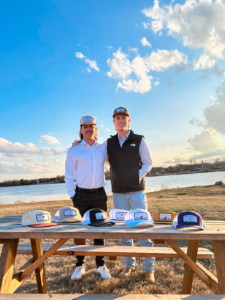 Long before Holden Rook and Brooks Gay were assigned a project in their entrepreneurship class requiring them to start a business, the roommates had already discussed starting their own venture.
Long before Holden Rook and Brooks Gay were assigned a project in their entrepreneurship class requiring them to start a business, the roommates had already discussed starting their own venture.
So when the class project met reality, they already had their plan ready.
Rook – a sophomore marketing major from The Woodlands – said the class brainstormed for “about 2-3 weeks” and then had to pitch the idea to Dr. Jim Litton, associate professor of Management Sciences and Director of the Griggs Center for Entrepreneurship & Philanthropy, who was teaching the entrepreneurship class.
“Brooks and I had expressed an interest in doing something before the class had even started, but it was Brooks who kick-started the idea in class,” Rook said. “Brooks was the brains behind the start of it since he’s from Abilene and knew the ins and outs of how to get our business started here locally.”
And that’s how Abilene Hat Company was born.
Gay – a junior business management major from Abilene – is a former baseball player at Abilene Wylie High School and last season at ACU, who had the original idea for a hat company.
“I wanted to create a hat company that represents Abilene and the surrounding areas because of the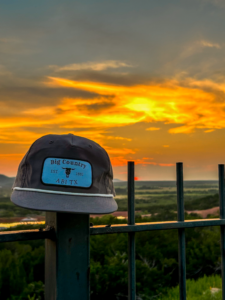 number of people who wear hats and how much pride people have in being from this area,” Gay said.
number of people who wear hats and how much pride people have in being from this area,” Gay said.
After making their pitch to Litton, getting approval, putting together a team, and dividing up responsibilities, the team – consisting of Gay, Rooks, ACU volleyball player Ashli Edmiston, Reece Westby, and Nick Schott – met about logistics and designs and began the process of giving life to the company.
“Our goal was to, first, make a good grade in the class,” Gay said. “We talked about our vision, bounced ideas off each other, and set our goals higher. We wanted to create the most revenue and profit in the current class and break the current record for revenue and profit ever in that class. We broke the current records and created the most revenue to date.”
The team is now just Gay and Rook, and they have moved the business forward to the point that they have a sales point online and in a storefront at Covey Apparel in Terrell, Texas.
“Our short-range goal was to find some local businesses willing to support another small business and give us a chance to get into their stores,” Rook said. “The long-term goal is to expand into all of West Texas to allow many people to see our brand.”
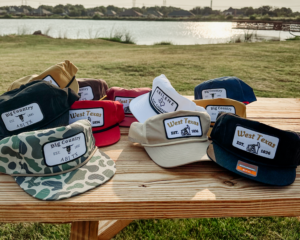 The company’s most popular hat logo is a patch on a rope cap with the words “West Texas” atop a pump jack, an iconic symbol of one of the lifebloods of West Texas life.
The company’s most popular hat logo is a patch on a rope cap with the words “West Texas” atop a pump jack, an iconic symbol of one of the lifebloods of West Texas life.
“One of our long-term goals is to create different pieces of apparel with similar ideas and designs,” Gay said. “I want to represent where we are from, the pride the people of West Texas have by capturing those feelings and displaying them on a high-quality product. I believe the patch design with the oil rig does the best job of capturing the spirit of the hard-working people of West Texas.”
Gay and Rook said their COBA classes have given them insight into so many different aspects of running a business, from the entrepreneurial mindset to all the areas of running a company.
“The most beneficial things I’ve learned have been small pieces from numerous classes,” Gay said. “We use Excel to keep our books, we use marketing strategies in our social media, and many other entrepreneurship techniques from the classes I have taken.”
Rook echoed some of that when describing what he’s learned inside the walls of the Mabee Business Building.
“Definitely learned more about the entrepreneurial mindset,” Rook said. “You must be ready to adapt to the market and whatever it’s feeding you to succeed. Everything is always changing, and you must be ready to change.”
While Rook said the next stop is continued growth and perhaps adding additional employees, Gay said he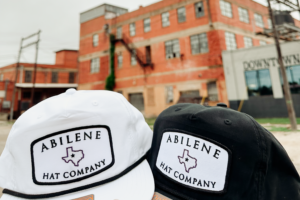 wants to expand the business into collegiate athletics, where Name, Image and Likeness (NIL) now allows student-athletes to promote products in exchange for money.
wants to expand the business into collegiate athletics, where Name, Image and Likeness (NIL) now allows student-athletes to promote products in exchange for money.
“That would not only be mutually beneficial for us and the student-athlete but will also significantly push our brand,” Gay said. “The athletes we are connected with at large schools have significant social media presence and will grow our total audience.”
To learn more about entrepreneurship at ACU, click here.
 Senior marketing major Carol Queiroz from Brazil recently completed a rewarding internship at Imaginuity, a marketing agency based in Dallas. Her experiences during this internship have not only enhanced her skill set but also prepared her for future career opportunities.
Senior marketing major Carol Queiroz from Brazil recently completed a rewarding internship at Imaginuity, a marketing agency based in Dallas. Her experiences during this internship have not only enhanced her skill set but also prepared her for future career opportunities. Carol credits her time at ACU as essential preparation for her internship and future endeavors. The Professional Development team, in particular, has been instrumental in her journey, providing support and resources throughout her college years.
Carol credits her time at ACU as essential preparation for her internship and future endeavors. The Professional Development team, in particular, has been instrumental in her journey, providing support and resources throughout her college years. At the outset of her internship, Katelynn participated in a comprehensive training program alongside other audit interns from the region. This training provided her with foundational knowledge and set the stage for her subsequent hands-on experience. One highlight of her internship was the Intern Innovation Experience, where she explored data visualization and analysis tools crucial to the accounting profession. This exposure to cutting-edge technologies broadened her perspective on the role of data in auditing.
At the outset of her internship, Katelynn participated in a comprehensive training program alongside other audit interns from the region. This training provided her with foundational knowledge and set the stage for her subsequent hands-on experience. One highlight of her internship was the Intern Innovation Experience, where she explored data visualization and analysis tools crucial to the accounting profession. This exposure to cutting-edge technologies broadened her perspective on the role of data in auditing. As Katelynn embarks on her professional journey, her experiences at EY and the foundation laid at ACU will undoubtedly propel her toward success in the accounting field. Her story is an inspiring reminder of the impact of internships and the importance of seizing opportunities in one’s academic and professional journey.
As Katelynn embarks on her professional journey, her experiences at EY and the foundation laid at ACU will undoubtedly propel her toward success in the accounting field. Her story is an inspiring reminder of the impact of internships and the importance of seizing opportunities in one’s academic and professional journey. Senior marketing major Noah While efficiently combined his academic knowledge with practical experience through an internship at Red Mansions Realty during his summer break. Throughout his tenure, Noah engaged in a diverse range of marketing activities, including the development of training materials for real estate agents. His contributions encompassed creating training materials for agents on procedures for tenant move-in forms, operating 360 cameras for property reviews, and utilizing marketing tools such as Canva to enhance their market presence.
Senior marketing major Noah While efficiently combined his academic knowledge with practical experience through an internship at Red Mansions Realty during his summer break. Throughout his tenure, Noah engaged in a diverse range of marketing activities, including the development of training materials for real estate agents. His contributions encompassed creating training materials for agents on procedures for tenant move-in forms, operating 360 cameras for property reviews, and utilizing marketing tools such as Canva to enhance their market presence. Noah said that his time at ACU has equipped him in several significant ways. Firstly, it has fostered more independence and confidence in his decision-making. Additionally, the networking opportunities and connections he’s made have been invaluable. Personally, he said “My faith has grown since being at ACU, which has reshaped my perspective on the business world. This most definitely is going to prepare me for life after graduation because keeping God first is what really matters.”
Noah said that his time at ACU has equipped him in several significant ways. Firstly, it has fostered more independence and confidence in his decision-making. Additionally, the networking opportunities and connections he’s made have been invaluable. Personally, he said “My faith has grown since being at ACU, which has reshaped my perspective on the business world. This most definitely is going to prepare me for life after graduation because keeping God first is what really matters.” For 26 years, the ACU College of Business Administration has hosted a Leadership Summit in the mountains of Colorado intended to re-energize the mind, body, and soul. Each Summit takes on a life of its own, providing answers to the questions the attendees bring with them each year.
For 26 years, the ACU College of Business Administration has hosted a Leadership Summit in the mountains of Colorado intended to re-energize the mind, body, and soul. Each Summit takes on a life of its own, providing answers to the questions the attendees bring with them each year.
 said. “For instance, after coming down from the mountain, my friend Matthew Trow (’24) and I initiated a Real Estate & Banking club on campus to assist students in navigating the industry. This year, I went to Summit seeking Godly wisdom and guidance and a time to wrestle with my inner struggles.
said. “For instance, after coming down from the mountain, my friend Matthew Trow (’24) and I initiated a Real Estate & Banking club on campus to assist students in navigating the industry. This year, I went to Summit seeking Godly wisdom and guidance and a time to wrestle with my inner struggles. “I think what makes Summit so impactful for people is that you get to retreat from everyday routine and spend time with like-minded people,” Harper said. “The connections and friendships I made at Summit are special because of our unity in Christ. Those connections have given me people to rely on, whether needing strong leaders to help with a ministry event or business and finance advice.
“I think what makes Summit so impactful for people is that you get to retreat from everyday routine and spend time with like-minded people,” Harper said. “The connections and friendships I made at Summit are special because of our unity in Christ. Those connections have given me people to rely on, whether needing strong leaders to help with a ministry event or business and finance advice. 
 Most trips to New York City involve plenty of sightseeing, tours, shows and musicals, and expensive trips to some of the world’s best restaurants. They don’t usually involve sit-down meetings with some of the top financial minds in the country. But that was the design of a trip to New York last fall for eight students in ACU’s Dukes School of Finance.
Most trips to New York City involve plenty of sightseeing, tours, shows and musicals, and expensive trips to some of the world’s best restaurants. They don’t usually involve sit-down meetings with some of the top financial minds in the country. But that was the design of a trip to New York last fall for eight students in ACU’s Dukes School of Finance. Canada (RBC) was great for them,” he said. “We went into RBC, where they set us up in the conference room, and we had people talking to us who were dealing in high-level investments and acquisitions daily.
Canada (RBC) was great for them,” he said. “We went into RBC, where they set us up in the conference room, and we had people talking to us who were dealing in high-level investments and acquisitions daily.  Stewart said he always gets help from ACU alums in the financial industry, using their connections and contacts with industry leaders in New York to set up the trip. One of those ACU graduates who helped this year was COBA alum Steve Swinney (‘94), based in Colorado and the CEO of Kodiak Building Partners who tapped his contacts in New York to meet with students from his alma mater.
Stewart said he always gets help from ACU alums in the financial industry, using their connections and contacts with industry leaders in New York to set up the trip. One of those ACU graduates who helped this year was COBA alum Steve Swinney (‘94), based in Colorado and the CEO of Kodiak Building Partners who tapped his contacts in New York to meet with students from his alma mater. Dallas because there are so many perspectives and different points of view in a big city than in a place like Abilene,” Stewart said. “But to see there’s a place for Christian businessmen and businesswomen to function and contribute and be part of that world was, hopefully, a healthy opportunity for our students.”
Dallas because there are so many perspectives and different points of view in a big city than in a place like Abilene,” Stewart said. “But to see there’s a place for Christian businessmen and businesswomen to function and contribute and be part of that world was, hopefully, a healthy opportunity for our students.” “We wanted the students to make real connections, and when you have eight students sitting in a room with three or four investment bankers, that’s a great opportunity,” Stewart said. “They had a real chance to talk to them, to exchange business cards, and network. There are so many stereotypes of New York, but it’s one of the world’s great cities, and having the
“We wanted the students to make real connections, and when you have eight students sitting in a room with three or four investment bankers, that’s a great opportunity,” Stewart said. “They had a real chance to talk to them, to exchange business cards, and network. There are so many stereotypes of New York, but it’s one of the world’s great cities, and having the  Swearingen, and Jim Litton (‘01) for their help in setting up the schedule of tours and visits. “It’s the heart of the financial world, especially in our country. I learn something new on every trip, and I come back energized, inspired, and thinking about ways I can incorporate what we’ve learned on the trips into what we’re learning in the classroom. It inspires me to stand in front of our students and encourage them to dream big and do what they want to do because they can make it happen. We are fortunate to have many people here and ACU friends and family willing to help make that happen.”
Swearingen, and Jim Litton (‘01) for their help in setting up the schedule of tours and visits. “It’s the heart of the financial world, especially in our country. I learn something new on every trip, and I come back energized, inspired, and thinking about ways I can incorporate what we’ve learned on the trips into what we’re learning in the classroom. It inspires me to stand in front of our students and encourage them to dream big and do what they want to do because they can make it happen. We are fortunate to have many people here and ACU friends and family willing to help make that happen.” Long before Holden Rook and Brooks Gay were assigned a project in their
Long before Holden Rook and Brooks Gay were assigned a project in their  number of people who wear hats and how much pride people have in being from this area,” Gay said.
number of people who wear hats and how much pride people have in being from this area,” Gay said. The company’s most popular hat logo is a patch on a rope cap with the words “West Texas” atop a pump jack, an iconic symbol of one of the lifebloods of West Texas life.
The company’s most popular hat logo is a patch on a rope cap with the words “West Texas” atop a pump jack, an iconic symbol of one of the lifebloods of West Texas life. wants to expand the business into collegiate athletics, where Name, Image and Likeness (NIL) now allows student-athletes to promote products in exchange for money.
wants to expand the business into collegiate athletics, where Name, Image and Likeness (NIL) now allows student-athletes to promote products in exchange for money.